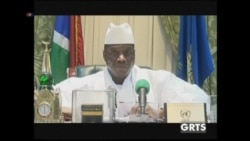Gambian President Yahya Jammeh declared a state of emergency after refusing to accept the results of last month’s election in which he lost to opposition leader Adama Barrow.
In a statement broadcast on state-run television Tuesday, Jammeh said state of emergency would last until the Supreme Court decides on a complaint his political party filed a week after the election citing voting irregularities.
“Under this state of public emergency, civil liberties are to be fully respected while all citizens and residents in the [sic] Gambia are banned from any acts of disobedience to the laws of the Gambia, incitement of violence and acts intended to disturb public order and peace,” he said. “The security forces are hereby instructed to maintain absolute peace, law and order throughout the country.”
WATCH: Jammeh statement on state of emergency
Gambia’s Supreme Court was expected to rule on the case January 10, but postponed the ruling until May because it was unsure that a peaceful political transition would take place.
Jammeh, who has ruled Gambia for 22 years, unexpectedly lost the December 1 election to Barrow. He initially indicated he would give up power peacefully, but has since refused, citing what he calls “an unprecedented level of foreign interference.”
The United Nations and several African leaders have called on Jammeh to step down peacefully.
West African regional bloc ECOWAS has placed its military force on standby, if Jammeh does not step down on January 19.
Earlier this month, Gambia's army chief reaffirmed his support for Jammeh in a letter published in a pro-government newspaper.
International military historian at the University Felix Houphouet-Boigny in Abidjan, Arthur Banga, says the Gambian military would likely be no match for ECOWAS forces.
Barrow had planned on moving forward with plans for the inauguration set for January 19 before the state of emergency was announced Tuesday.







